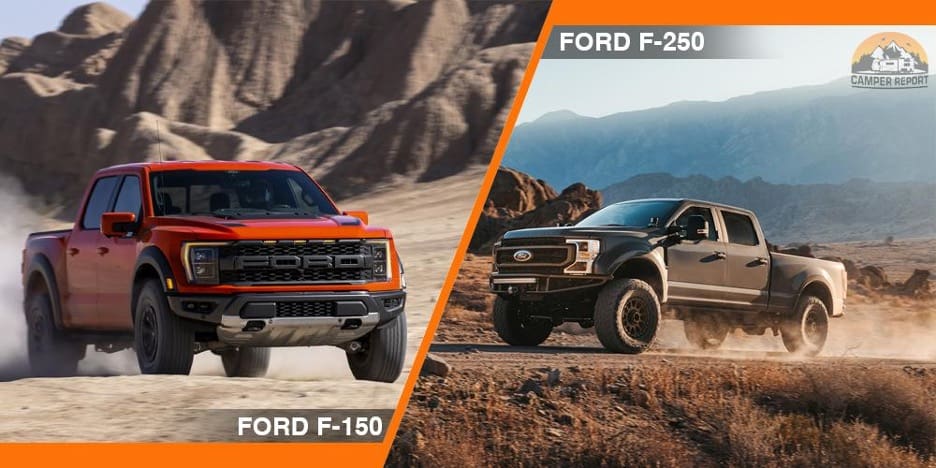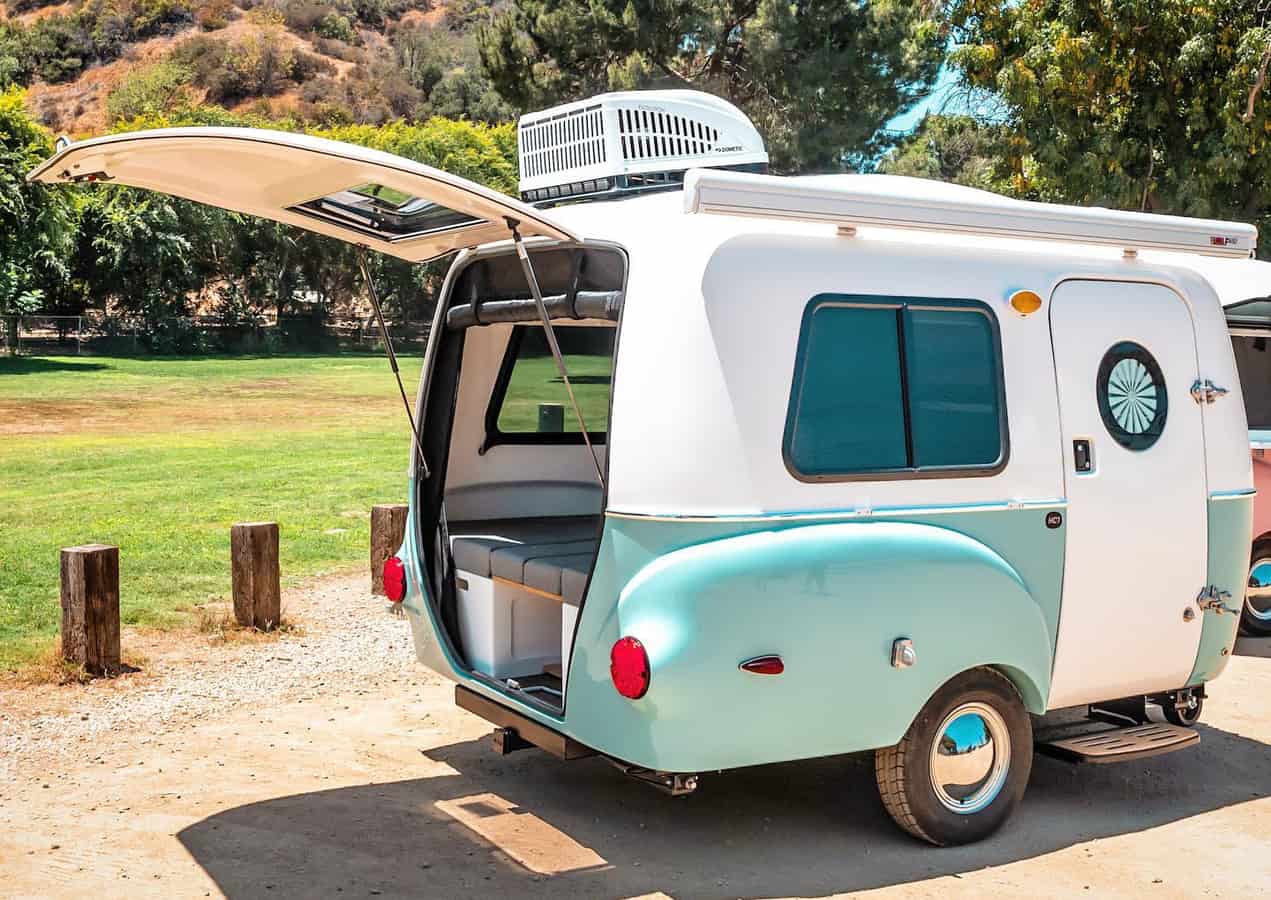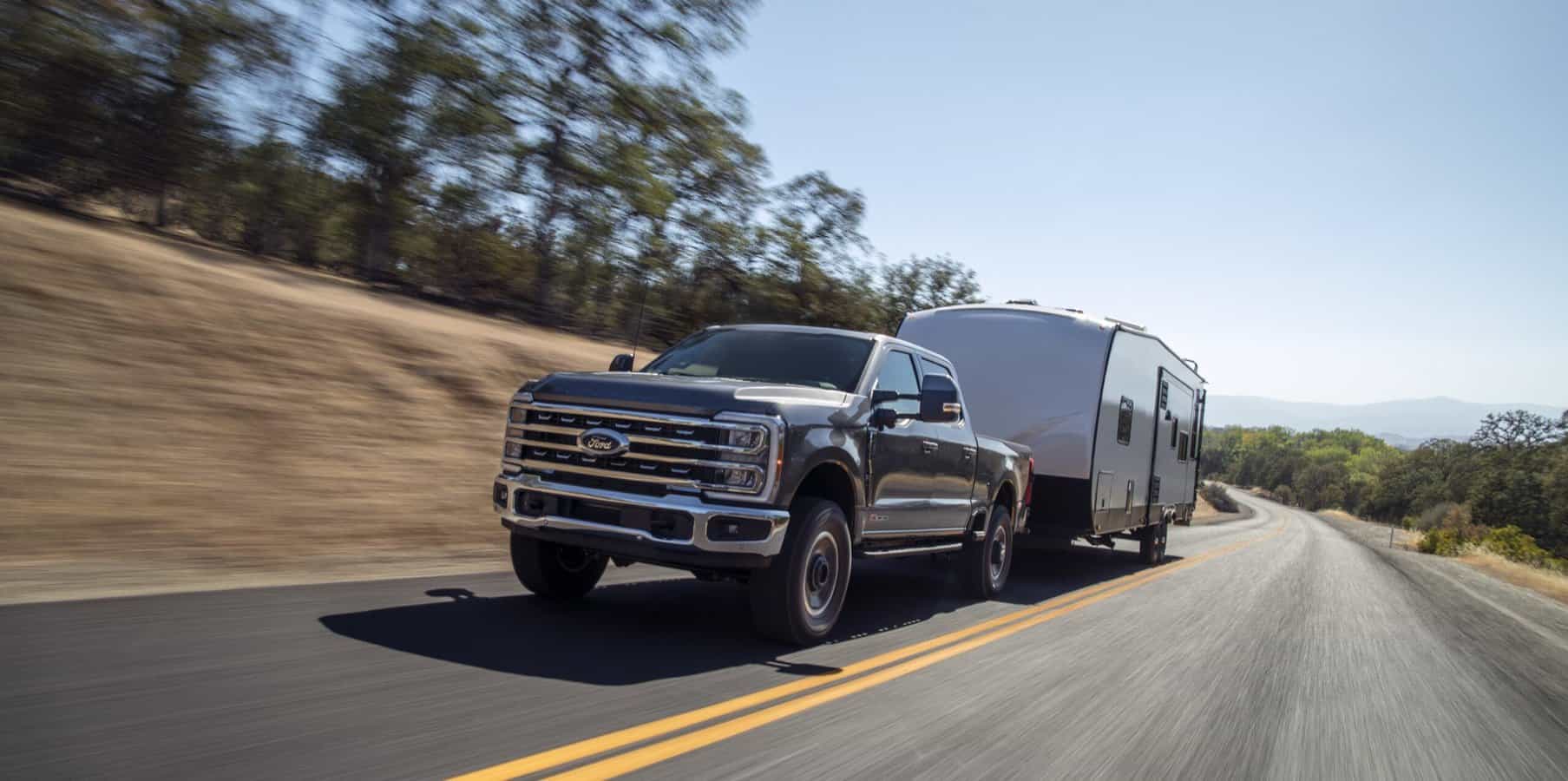
Ford F150 vs F250: Which One Is Best For Towing A Travel Trailer?
The Ford F150 and F250 series are two of the most versatile vehicle series. But do you know the differences between the two?
The Ford F250 is best for towing a travel trailer. With up to 20,000 pounds towing capacity, the F250’s massive engines offer incredible towing capacity compared to the F150 with 14,000 pounds towing capacities. Read on for more insights about these two fantastic Ford models as we compare the F150 vs F250.
Ford F150 vs F250: Comparison Table
| Specs | F150 | F250 |
|---|---|---|
| Size | Weighs 5,100 pounds | Weighs 5,677 – 7,538 pounds |
| Towing | 11,500 – 14,000 Pounds | 15,000 – 20,000 Pounds |
| Payload | 1,270 – 2,890 lbs | 3,040 – 4,260 lbs |
| Engine | 6 | 3 |
| Type | Light-duty truck | Heavy-duty truck |
| Reliability | 7/10 | 10/10 |
| Price | $29,000-$71,000 | $35,000-$85,000 |
Ford F150 vs F250: Details Comparison
Light-Duty vs Heavy-duty Truck
The core difference between the Ford F150 and F250 is their weight and performance. Put differently, the class that both trucks belong to. The F250 belongs to the three-quarter-ton class, while the F150 belongs to the half-ton class truck. As a result, the F150 is regarded as a light-duty truck while the F250 is a heavy-duty truck.
All trucks, regardless of the brand, belong to different class specifications. For example, a truck can either belong to the heavy-duty, medium-duty, or light-duty class. These classifications help truck owners understand the type of jobs that their trucks are suited for. Therefore, truck distinctions do not indicate inferiority. Instead, it lets buyers know what tasks their trucks will perform.
For example, a light-duty truck is best for light work uses, while a heavy-duty truck is better for hauling large loads. The F150 supports uses for recreation and light work, while the F250 is necessary for hauling heavy loads.
Towing and Payload
As we established earlier, the primary class distinction between the F150 and F250 is what they are built to do. Thanks to its heavy-duty build, the F250 has greater towing and hauling capacities compared to the F150. Regardless, the F150 also offers decent towing power.
The high-end F150 like the two-wheel drive, EcoBoost, 3.5-liter, long-bed, and crew-cab will conveniently tow a maximum of 14,000 pounds. On the other hand, F250 trucks can tow up to 20,000 pounds.
Both trucks feature aluminum military-grade and high-end steel strength frames and fully boxed aluminum bodies. But due to their class distinction, they offer different payload ratings. The F150 has a varying payload between 1,270 and 2,890 pounds, while the F250 has other payloads between 3,040 and 4,260 pounds.
Engine
The F150 has a smaller engine compared to the F250. However, it does not lack power. Different engine options ranging from a 2.7L V6 engine to a 5.0L V8 engine add variety to your selection.
Ford F150 engines
- 3.5L EcoBoost® V6 – 400 hp and 500 lb-ft of torque
- 3.3L Ti-VCT V6 – 290 hp and 265 lb-ft of torque
- 5.0L Ti-VCT V8 – 400 hp and 410 lb-ft of torque
- 2.7L EcoBoost® V6 – 325 hp and 400 lb-ft of torque
- 3.5L PowerBoost® Full Hybrid V6 – 430 hp and 570 lb-ft of torque
- 3.0L Power Stroke® V6 – 250 hp and 440 lb-ft of torque
Since the Ford F150 is designed to offer more services besides carrying and towing large loads, it has more engine options. You can choose between any of six engines, each with different capabilities, including speed and performance.
Basic F150 models come with the standard 3.3L Ti-VCT V6 engine. However, the 2.7L EcoBoost is more powerful. Following the progression, the 3.5L V6 Ecoboost Powers Ford’s off-road machine; hence, it is more powerful. All three engines come with direct injection and dual-port fuel systems. Nonetheless, the 3.0L Power Stroke engine offers more horsepower and torque with an impressive fuel economy design.
The 5.0L Ti-VCT V8 engine is the largest engine option of the F150 series. As a result, you will find it on expensive models like the Platinum and King Ranch. The engine can run on either natural or propane gas. All the engine options apart from the 3.3L engine feature a 10-speed automatic transmission with five driving modes. The modes are:
- Normal
- Tow/haul
- Sport
- Snow/Wet
- EcoSelect
Ford F250 engines
Unlike F150, F250 offers just three engine options:
- 6.7L Power Stroke® Turbo Diesel – 475 hp and 1,050 lb-ft of torque
- 6.2L V8 Gas – 385 hp and 430 lb-ft of torque
- 7.3L PFI V8 – 430 hp and 475 lb-ft of torque
The F250 engine can be configured for conventional, 5th wheel, or gooseneck towing, and truck owners can tow up to 20,000 pounds. The 6.7 Power Stroke diesel engine has aluminum cylinder heads and a compacted graphite iron engine block. It also features a single turbocharger between the cylinder head and is paired with a six-speed automatic transmission. The 6.2L engine runs on either propane or natural gas.
Size
Both Ford F150 and F250 trucks share a common structure. The A-pillar to the rear is the same in both series. However, the box lengths and A-pillar forwards are different for both models.
The longest F150 wheelbase is 163.7 inches, while the shortest is 122.4 inches. On the other hand, the longest F250 wheelbase is 176 inches, while the shortest is 141.6 inches. The F250 also has an overall length of 266.2 inches and 250.5 inches for the F150. The F250 has 81.5 inches maximum cab height, and the F150 has 77.3 inches maximum height.
Reliability
The F150 offers incredibly reliable performance for everyday use. However, due to its light-duty design, it is not very functional for towing a more than 14,000 pounds trailer. On the other hand, the F250 can go well above towing 14,000 pounds.
Price
Both the F150 and F250 models are available in six trim levels. They include:
F150
- XL: $28,940
- XLT: $35,050
- LARIAT: $44,695
- King Ranch: $56,330
- Platinum: $59,110
- Limited: $70,825
F250
- XL: $34,230
- XLT: $39,095
- LARIAT: $47,210
- King Ranch: $59,595
- Platinum: $65,515
- Limited: $84,190
Conclusion
Price is the most obvious advantage the F150 has over the F250. However, the F250 offers an impressive performance in terms of payload capacity and towing strength. Thanks to its incredible towing capacity of up to 20,000 pounds, the Ford F250 is best for towing a travel trailer.
Driving or towing an RV is different. You can’t drive as far, as long, or as fast. Knowing where you need to stop at the end of the day is a challenge, unless you have RV LIFE Trip Wizard. The unique Driving Radius provided by RV LIFE Trip Wizard shows you exactly where to stop and find a campground or RV park, based on criteria you have set. Plan ahead, plan smart, and know exactly where to stop.




Don’t forget the 150 diesel. Got up to 30 mpg when not towing. 12-15 mpg when towing.
I downsized from a 2500hd to a F150 because I wanted one vehicle that could be towed behind my V10 motorhome but still do duty towing my 3 horse bumperpull.
I have owned an F350. F450 and 2500HD. All towed better than the F150 but none were as comfortable as a daily driver or would have been towable by a gas motorhome. The V8 F-150 has plenty of horsepower but HP is not the deciding factor in towing. The bigger truck didn’t have more HP but they did have more stopping power. I barely notice the horse trailer behind the F53 motorhome despite it having 80hp less than the F-150. It’s the weight, wheelbase and size of the brakes that make bigger vehicles better at towing.
Fully boxed bodies? Don’t you mean fully boxed frames? Also doesn’t the F-250 have better braking capability than the F-150?
Is this up to date? I thought the 3 liter diesel was dropped and what happened to the FX 4 trim?
I towed my 34′ TT with 150 and then went to 250 diesel 4×4 beside better handling the stopping abilities are a huge difference.
Both trucks feature aluminum military-grade and high-end steel strength frames and fully boxed aluminum bodies, should read. Both trucks feature fully boxed high-end steel strength frames and aluminum military-grade bodies. Also can you tell me how it is possible to fill my F-150 with propane or natural gas?
Not a helpful or informative article at all. Reasons:
1. You fail to mention that the 350 trucks are only slightly more expensive and way more capable than the 250s.
2. In Canada, the 350 is not subject to luxury tax and is therefore actually cheaper than the 250.
3. If you only want to tow a bumper pull RV of 8000 lbs or less, then the Ford F-150 Powerboost is perfectly capable and way cheaper than any diesel 250 / 250 and much more economical. Not everyone needs to tow a 40’ Fifth wheeler.
Please balance your articles better in future.
In next week’s issue… What vehicle works better at hauling around 7 people. A three row SUV or a motorcycle. Readers want to know. LOL. I’m just kidding but for reals, which truck is better for towing, a pickup build for towing or a smaller pickup build for everyday use?
I don’t need a semi or a F250 to pull a 5,000 pound travel trailer.
Ram 1500 ecodiesel
Now, give us a comparison for the Ram and GM (Chevy / GMC) 1/2 ton & 3/4 ton series. Then compare all three manufacturers together.
Everyone looks at towing capacity, which can be misleading. A potential buyer also need to look at load carrying capacity. This comes into the picture when dealing with a goose-neck of fifth-wheel trailer. The pin weight quite often exceeds load carrying capacity even though the trailer is withing “specs.” For instance, I have an 8500# fifth-wheel that is under the 14,000# limit on your F150 but when hooked up to a F150 the pin weight exceeds the limit on the F150 especially if the F150 has added weight of a higher trim level. Also, too many trailer manufacturers advertise their trailers are “half-tone towable” but max or over load any half-ton. It is also advised that the operator stay below the “max” for safety and serviceability. Yea, I know, I sound like a member of the two police
Dear Mr. McGrew:
I read your comparison of F150/F250 recently, with interest. I have a 2016 F250 diesel superduty. On my door frame the yellow sticker specifies a total weight capacity of 10,000#. It lists the weight of the truck – ~7,500# =/- a few pounds. That leaves a little more than 2,000 pound for the “payload.” So I have a question – under what circumstances (accessories, etc) would my payload be anywhere between the 3,000 and 4,200# you cited in your article. My curiousity stems from the extensive discussions, some of get pretty insistent and contentious, in camper forums (see Keystone forums in particular). the gist of the discussion seems to be the claim that an F-250 can only accommodate about 2,000# of weight (tongue weight for 5th wheel and the weight of passengers/gear/gas, etc.
The tongue weight of my camper is about 2,000# and I estimate there’s maybe 750# of other items. That puts me close to 3k #’s. However, I’ve never sensed or felt any. kind of strain or lack of power and I’ve put about 40,000 miles on the truck pulling my 5th wheel. Looking around campgrounds I see many, many other F250’s pulling at least as heavy campers as I have. Are we all living dangerously? I’d love to hear your opinion on this. Thank you for your time and attention to my inquiry.
I can tell you first hand about the differences in towing a travel trailer with the F150 or the F250. I had an 2018 F150 3.5 EB, 10 speed, long bed, Max tow pkg etc. I ordered it with everything to help me tow our 2019 Cougar 29BHS. (8800 lb gvw). I did some work to dial in the Curt 10K weight and sway. It towed great. 11.5 mpg towing -21 to 26 mpg regular driving depending on the trip. I might tow 8 to 10 times a year. I MISS THE GREAT MILEAGE NOT TOWING> The F250 tows great like it’s not there. The handling while towing is quite a bit better than the 150. Towing the gas mileage is 10.5 to 11.5 depending on the trip. Regular driving MPG is 13.7 no matter how I am driving. I ordered this truck for towing also. I got the 5th wheel prep, camper pkg, dual batteries etc. Prefer the 250 but the 150 was no slouch!!!
Good article. I really like the way you cut to the chase up front & don’t make the reader wade though an entire article for the answer.
I also like the supporting details offered in the rest of the article.
Sure wish there was a diesel hybrid option.
I have a 2019 F-150 XLT SuperCrew Short-bed 4×4 FX4 with the Max Trailer Tow Package and 3.5L ecoBoost twin turbo engine. The GCWR for this vehicle is 16,200 pounds, so there is no way it can tow a 14,000 pound TT. It can, however, tow an Airstream 2020 Flying Cloud 27FBT just fine, with the combination within the GCWR of the truck and the GVWR of both the truck and trailer, and with all axles within their GAWR. Also, the truck seats 6 adults in comfort, with lots of rear seat leg room AND, I routinely get over 24 MPG in highway travel (when not towing the trailer). So it’s a great multi-purpose, around town or across country vehicle with great ride quality and handling (since it’s not an HD truck). Towing the TT, I get between 12 and 13 MPG. Towing performance is excellent, even in hilly/mountainous terrain. Obviously MPG depends on terrain and how one drives (acceleration, braking, speed, etc.).
What the braking and climbing ability, the going up and down the mountains; like the Rocky Mountains range, Sierra Mountains range
We had a 2014 Ford F150, large V8, 2-wheel drive XLT. It was one of the best vehicles I have ever owned out of more than 50 in my driving lifetime. We used it to competently pull our flat-front travel trailer as well as being a comfortable, enjoyable daily driver for regular transportation. When we upgraded to a larger and slightly heavier fifth-wheel, we arrived near the limit of the posted towing capacity so we traded to a 2014 Chevy 2500 diesel 4-wheel High Country. Both trucks were/are cosmetically beautiful. With the truck connected to the trailer, the Chevy is absolutely wonderful to drive. As a daily driver, not so much. The ride is annoyingly rough and, as a daily driver, the Chevy is a poor choice.
If you are really serious, a 250/2500 diesel or better yet a 350/3500 Diesel is the vehicle to tow with.
We traded in our Nissan pickup and purchased a Ford F150 XLT with the 6 cylinder eco boost . The Nissan was rated to haul about 7,000 lbs. 8,000 lbs. We have a 22 ft. trailer so the Nissan was always dragging. We have had no problems hauling the trailer with the F150. I have to watch the speed when hauling the trailer now with the F150 because it is almost like it isn’t hauling anything . We don’t plan on getting anything bigger, so we are now set with what we have.
Your description of the 2 models of Ford truck seems fine but it isn’t clear to me why you repeatedly state the F250 is best for towing a travel trailer. Wouldn’t you say an F150 with a tow package would be a good match for a light weight trailer? An F250 would be overkill for a 3500-4000 lb trailer wouldn’t it?
I liked your comparison of the F150 vs F250. Earlier this year I was looking at either a F150 or F250 to replace our existing 2011 F150 we had, and this comparison is helpful for others looking choosing between the two models. One suggestion to add for the F150 is one of the options is to buy the F150 with the Heavy Duty Payload package with 6.5ft bed. This increases the payload to 2436lbs from the more typical 1500 to 1800 lbs and increases the rear GAWR to 4800lbs. I really like the 3.5L Ecoboost engine too. This more than meets our needs towing a 6500lb travel trailer. In our case, we would exceed either the payload or rear GAWR before we would exceed the towing capacity.
Thanks for the great review.
What you don’t see here is that the F250 has a bigger rear end and bigger brakes! These contribute to increased stability. It is like buying cheap life insurance and you need not die to collect. I just replaced my 20 year old F250 with a 2022 F350. And my trailer is only about 6500 loaded. F350 is only a few hundred more than a 250.
gibberish. if bigger was better then a 350 or 450 or 550 would be better.
if you have a 4000 lb trailer and are looking for ride COMFORT then the 250 is out. I have several friends who drive in my 150 limited and wish they had NOT purchased a 250. the major difference is the ride quality.
SO the real answer is::::::it depends! what, your towing, what you want in size and comfort, etc.
I think you forgot to take the terrain into consideration ,14000 lbs might be fine flat and level but the minute you gets to hills and mountain you will know the difference.i actually believe that tow ratings are over rated ,I got tired of white knuckle driving with transport trucks up hills and bought a f250 the difference was night and day even though my trailer is only 8000 pounds
I have a Toyota Tacoma 2021 2 wheel drive v6 3.5 liter engine. What is the maximum weight travel trailer I can tow and how does it compare to the Ford F-150. It is one thing what a vehicle can tow but how about stopping down a long grade.
Good summary of both vehicles. But your title is too vague. It really depends on what size (weights) trailer you are towing. No point in having a truck that you only use a fraction of its ability. Conversely, it’s not wise to use a truck at the maximum of is specifications. The trick is to find the truck that matches your load at around 70-80% of it’s specs. The new f150(2021 on) has an amazing capability for anyone towing a trailer up to 8000lbs and a moderate payload. When not towing (80% of the time) you have a really versatile and economical vehicle.
So, if you own a F-150 or a Chevy 1500 you shouldn’t think about towing anything camper related? That’s the gist.
Hi Alvin,
Just read your article about F150 vs. F250. I agree the 250 is the better towing vehicle for big rvs. I did buy a F150 to tow a 31 foot travel trailer to Colorado from Birmingham, AL. My truck had the tow package so it was ready for pulling my 7,500 pound rv. We went through a nearly 11,000 foot pass in Colorado with the truck and rv. and many other places. The F150 performed beautifully. I was slower on the interstate than those 250s, but have been happy with the truck. Sway was minimal and we rarely had underperformance by the engine. Just my thoughts. Best.
John Staed, Pelham AL
One thing you failed to mention is the braking system in the F250 is more robust, thus making it easier and safer to stop with even the 14000 lb load
The articles I have read in Trailer Life (now RV life) recommend a maximum of half the advertised towing capacity. Having switched from half ton to 3/4 ton myself, I very much agree. The heavier truck is much more stable on the road, especially when you have to accelerate to match traffic speeds on a left exit.
The wave-front from a passing large truck is much more manageable with the heavier truck. Also, do not buy a trailer unless it has shock absorbers, do not believe the salesmen, they just want your money.
Good article, but it overlooks the advantages of diesel over gas engines. Towing is all about torque, not horsepower or payload capacity. And when you need torque, you want diesel.
The specs can be misleading. For example, the F-150 5.0L V8 gas engine, and the 3.0L V6 diesel have comparable torque (400 vs 440 lb-ft), but the diesel delivers that higher torque at a mere 175O rpm vs 4500 rpm for the gas engine. That’s why I traded in my gasser for the F-150 3.0L diesel. My v6 diesel almost effortlessly tows my TT in high gear at low rpm where my v8 gasser was screaming at high rpm in low gear to deliver the same torque.
The Ford EcoBoost engines have a torque curve that looks much more like a diesel … dramatic torque surge between 1,500 and 2,000 rpm and then pretty much flat until 6,000+
I found pulling a 7,800 lb trailer with the 3.5 a breeze … just had to watch the speedometer … found 85 a couple of times without realizing it.
That said, a heavier vehicle would be nice if I was towing all the time.
Depends a lot on how often you tow vs commute or just drive ….
On pure numbers agreed the F250 can pull bigger weight and has a higher payload, but I think the important piece is understanding what you are pulling. If you are towing a 7000lb. trailer do you need the 250? is the gas mileage better in the 150? are you using the truck as your everyday driver in addition to pulling a trailer? Just some other things to think about but I agree the 250 can pull and carry more.